LIKE FATHER LIKE SON
Bëmë baba, të të ngjaj. (Albanian)
Make me father, to resemble you.
Крушата не пада по-далеч от дървото. (Krushata ne pada po-dalech ot darvoto.) (Bulgarian)
The pear doesn't fall far from the tree.
De tal riu, tal aigua. (Catalan)
Like river like water.
Æblet falder ikke langt fra stammen. (Danish)
The apple doesn't fall far from the trunk.
Der Apfel fällt nicht weit vom Stamm. (German)
The apple does not fall down far from the tree.
Deda naxe, mama naxe, shvili ise gamonaxe. (Georgian)
Like mother, like father is a child.
Rogoric eri, iseti beri. (Georgian)
Like nation, like monk.
Kata mana kata kyrh kata gio kai thygatera. (Greek)
Like mother, like father, like son and daughter.
Το μήλο κάτω από τη μηλιά θα πέσει. (Greek)
The apple will fall from the apple tree.
Nem esik messze az alma a fájától. (Hungarian)
The apple doesn't fall far from the tree.
Kāds tēvs, tāds dēls. (Latvian)
Like father, like son.
Obuolys nuo obels netoli rieda. (Lithuanian)
The apple does not roll far from the apple tree.
Bhaz-zokk il-fergha. (Maltese)
As the trunk so the branch.
Niedaleko pada jabłko od jabłoni. (Polish)
The apple does not fall down far from the tree.
Filho de peixe sabe nadar. (Portuguese)
A fish's child knows how to swim.
Așchia nu sare departe de trunchi. (Romanian)
The woodchip doesn't jump far from the trunk.
Каков поп, таков и приход. (Kakov pop takov i prihod.) (Russian)
What the priest is like, so is the church.
От осинки не родятся апельсинки. (Ot osinki ne rodyatsa apelsinki.) (Russian)
Oranges can't grown on an aspen tree .
Iver ne pada daleko od klade. (Serbian)
The chip doesn't fall far from the block.
Aká matka, taka Katka. (Slovak)
Like mother like Kate.
Jabolko ne pade daleč od drevesa. (Slovenian)
The apple doesn't fall far from the tree.
De tal palo tal astilla. (Spanish)
From such stick comes such splinter.
Äpplet faller inte långt från trädet. (Swedish)
The apple does not fall far from the tree.
Armut dibine düşermiş. (Turkish)
The pear falls right onto its bottom.
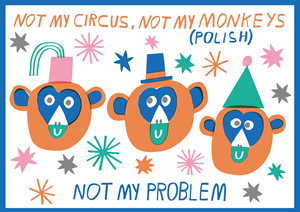
YOU CANNOT MAKE A SILK PURSE OUT OF A SOW’S EAR
Al draagt een aap een gouden ring, het is en blijft een lelijk ding. (Dutch)
Even if the monkey wears a golden ring, it remains an ugly thing.
On ne peut faire d'une buse un épervier. (French)
You can't turn a buzzard / a dolt into a sparrowhawk.
Fare le nozze coi fichi secchi. (Italian)
To do a wedding with dried figs.
I w Paryżu nie zrobią z owsa ryżu. (Polish)
Even in Paris they will not change oat for rice.
Corbul în zadar se spală, că negreaţa nu şi-o pierde. (Romanian)
A crow is never the whiter for washing herself often.
Рожденный ползать летать не может. (Rozhdennyj polzat letat ne mozhet.) (Russian)
If you’re born to crawl, you can’t fly.
Opica zostane opicou, hoci by si na nu zlatú retaz povesil. (Slovak)
Monkey remains monkey even if you hang a golden kettle around its neck.
Aunque la mona se vista de seda, mona es y mona se queda. (Spanish)
Although the monkey-girl wears silk clothes, she is a monkey and remains a monkey.
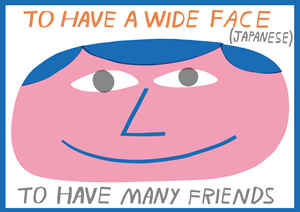
A SANDWICH SHORT OF A PICNIC
Fali mu/joj daska u glavi. (Bosnian)
To miss a board/plank in your head.
Šplouchá mu na maják. (Czech)
It's splashing on his lighthouse.
Ikke at være den skarpeste kniv i skuffen. (Danish)
Not to be the sharpest knife in the drawer.
Hij heeft een klap van de molen gehad. (Dutch)
He got a blow from the windmill.
The lift doesn't reach the top floor (English)
Avoir une araigneé au plafond. (French)
To have a spider on the ceiling.
Ne pas avoir inventé le fil à couper le beurre. (French)
Not to have invented the wire to cut butter.
Nicht alle Tassen im Schrank haben. (German)
Not to have all the cups in the cupboard.
Nincs ki mind a négy kereke. (Hungarian)
Not to have all four wheels.
Non avere tutti i venerdì. (Italian)
To be lacking some Fridays.
Viņam visi nav mājās. (Latvian)
He doesn't have everybody at home.
Jumts aizbraucis. (Latvian)
The roof is gone.
Jam ne visi namie. (Lithuanian)
He doesn't have everybody at home.
Tem macaquinhos no sotão. (Portuguese)
He has little monkeys in the attic.
Nu are toate țiglele pe casă (Romanian)
He/She doesn't have all the roof tiles on the house.
Без царя в голове. (Bez tsarya v golove.) (Russian)
Not having a tsar inside his head.
Lud ko struja (Serbian)
As crazy as electricity
Má o koliesko menej (Slovak)
To have one less wheel
Straší mu vo veži (Slovak)
His tower is haunted
Zostat na ocot (Slovak)
To be left for vinegar
Más loco que un plumero (Spanish)
Crazier than a feather duster
Le falta un tornillo (Spanish)
To miss a screw.
Adamın tahtası eksik (Turkish)
Some planks are missing from his roof.
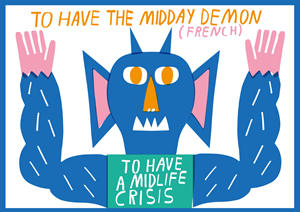
THE POT CALLING THE KETTLE BLACK
Rugala se sova sjenici. (Croatian)
The owl mocked the tit.
C'est l'hôpital qui se moque de la Charité. (French)
The hospital mocks the Charity.
Eipe o gaidaros ton petino kefala. (Greek)
The donkey called the cockerel "dunderhead".
Ein Esel schimpft den anderen Langohr. (German)
A donkey calls the other a rabbit.
Bagoly mondja verébnek, hogy nagyfejű. (Hungarian)
The owl tells the sparrow that it is big-headed.
Il bue che dice cornuto all'asino. (Italian)
The ox calling the donkey "horned".
Râde hârb de oală spartă. (Romanian)
A broken part of the pot is laughing at the broken pot.
Яйца курицу не учат. (Russian)
Eggs don't teach a chicken
Zabudol vôl, že teľaťom bol. (Slovak)
The ox has forgotten that he had been a calf, too.
Le dijo la sarten al cazo. (Spanish)
As the pan told the pot.
Yavuz hırsız ev sahibini bastırır. (Turkish)
Bold burglar suppresses the landlord.
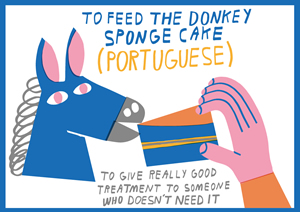
ONCE BITTEN, TWICE SHY
Ko se jednom opeče, taj i u hladno puše. (Bosnian)
Who burns themselves once (by a hot drink), blows into the cold one too.
Brændt barn skyr ilden. (Danish)
A burned child shuns the fire.
Chat échaudé craint l'eau froide. (French)
Scalded cat fears cold water.
Ein gebranntes Kind scheut das Feuer. (German)
A burned child shuns the fire.
Opoios kaei me to xilo, fusaei kai ti giaourti. (Greek)
Whoever gets burnt from the porridge, blows on the yogurt, too.
Chi si è scottato con l'acqua calda, ha paura anche di quella fredda. (Italian)
Whoever gets burnt from hot water, is afraid of cold one too.
Cão picado por cobra, tem medo de linguiça. (Portuguese)
A dog that has been bitten by a snake fears sausages.
Cine s-a fript cu ciorbă, suflã și în iaurt. (Romanian)
The one who burnt his tongue with soup is going to blow on yoghurt as well.
Ulciorul nu merge de două ori la apă! (Romanian)
You cannot do the same trick twice.
Пуганая ворона куста боится. (puganaya vorona kusta boitsya) (Russian)
A spooked crow is afraid of a bush.
Пуганная ворона собственной тени боится. (puganaya vorona sobstvennoj teni boitsya) (Russian)
A spooked crow is afraid of it's own shadow.
Koho raz had uštipne, aj hlísty sa bojí. (Slovak)
Who has been bitten by a snake is afraid even of a worm.
Kogar je pičila kača, ta se zvite vrvi boji. (Slovenian)
Whoever was bitten by a snake is afraid of the twisted rope.
El gato escaldado del agua fria huye. (Spanish)
The cat that has been scalded runs away from cold water.
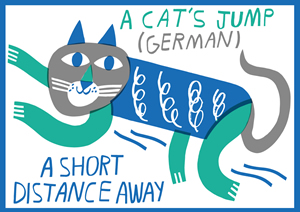
TO CARRY COALS TO NEWCASTLE
Eulen nach Athen tragen (German)
Taking owls to Athens
Vizet hord a Dunába (Hungarian)
Taking water to the Danube
Vendere ghiaccio agli eschimesi (Italian)
Selling ice to the eskimos
Uz mežu malku nenes (Latvian)
Don't carry firewood to forest
Wozić drewno do lasu (Polish)
To carry wood to the forest
A vinde castraveți grãdinarului (Romanian)
Selling cucumbers to the gardener
Yezdit v Tulu so svoim samovarom (Russian)
He’s going to Tula taking his own samovar
Nositi drvo do lesa (Slovak)
To carry wood into the forest
Echar agua al mar (Spanish)
To throw water into the sea
Llevar naranjas a Valencia (Spanish)
Taking oranges to Valencia
Tereciye tere satma (Turkish)
Don't sell cress to the cress-seller
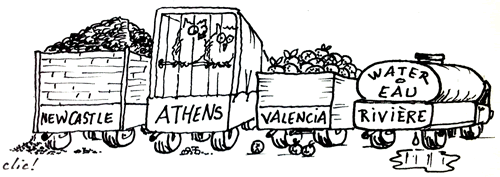
TO BEAT ABOUT/AROUND THE BUSH
Chodit kolem horké kaše. (Czech)
To walk around hot porridge.
Kiertää kuin kissa kuumaa puuroa. (Finnish)
To pace around hot porridge like a cat.
Y aller par quatre chemins. (French)
To get there by four paths.
Tourner autour du pot. (French)
To move around the pot.
Kerülgeti a forró kását. (Hungarian)
To avoid the hot porridge.
Å gå som katten rundt den varme grøten. (Norwegian)
To walk like a cat around hot porridge.
A umbla cu fofârlica. (Romanian)
Qalking with the lark.
Ходить вокруг да около. (Khoditj vokroog da okolo.) (Russian)
To walk round and about.
Chodit okolo horúcej kaše. (Slovak)
To walk around hot porridge.
Emborrachar la perdiz. (Spanish)
To get the partridge drunk.
Irse por la ramas. (Spanish)
Going along the branches.
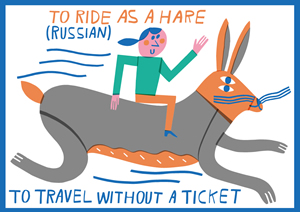
TOO MANY COOKS SPOIL THE BROTH
Seul mui à vugulion a vez, e vez falloc'h gouarnet ar saout. (Breton, France)
The more cowherds there are, the worse the cows are looked after.
Puno baba, kilavo dijete. (Croatian)
Many midwives, child will be lazy.
Veel varkens maken de spoeling dun. (Dutch)
Many pigs make the slops sparse.
shvidi dzidzis xelshi bavshvi daikarga. (Georgian)
A child, looked after by seven nannies is lost.
Zu viele Köche verderben den Brei. (German)
Too many cooks ruin the broth.
Opou laloun polla kokoria, argei na xhmerwsei. (Greek)
Where there are too many roosters singing the dawn comes late.
Sok bába közt elvész a gyerek. (Hungarian)
If there is too many midwives, the child will be lost.
Troppi galli a cantare non fa mai giorno. (Italian)
Too many cocks singing it is never going to dawn.
Tarp dviejų auklių vaikas be galvos. (Lithuanian)
Between two nannies a child leaves without his head.
Gdzie kucharek sześć, tam nie ma co jeść.
(Polish)
Six cooks and nothing to eat.
Copilul cu multe moaşe rămâne cu buricul netăiat. (Romanian)
The child who has many midwives ends with his umbilical cord uncut.
У семи нянек дитя без глазу. (U semi nyanek dyetya byez glaza.) (Russian)
A child, looked after by seven nannies is without one eye.
Horozun çok olduğu yerde sabah geç olur. (Turkish)
Where there are too many roosters, dawn comes late.
Muchas manos en un plato, hacen mucho garabato. (Spanish)
Many hands on a plate draw many doodles.
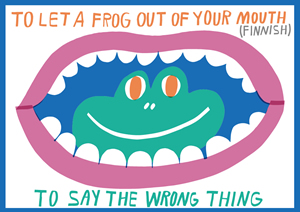
DON’T CRY OVER SPILT MILK
Gviania titze kbena (Georgian)
To bite one's finger is late
Eso után köpönyeg (Hungarian)
Coat after rain
Nu plânge după laptele vărsat (Romanian)
Do not cry over spilt milk
Kusat sebe lokti (Russian)
To bite one’s elbows
Bolje sprečiti, nego lečiti (Serbian)
It's better to prevent than to cure
Po toči zvoniti je prepozno (Slovenian)
It's too late to ring after the hail
Paid â chodi pais ar ôl piso (Welsh)
Don't lift a petticoat after peeing
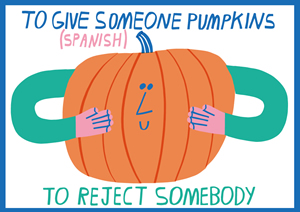
BAD WORKMAN BLAMES HIS TOOLS
На крива ракета космосът й пречи. (Na kriva raketa kosmosat i prechi.) (Bulgarian)
An awry/bad rocket blames the space.
Wenn der Bauer nicht schwimmen kann, liegt es an der Badehose. (German)
If the farmer can't swim, it's due to his swimming trunks.
नाच ना जाने आँगन टेढा. (Naach na jaane anagan thedha.) (Hindi)
One who knows no dance claims that the stage is tilted.
Zlej baletnicy przeszkadza rabek u spódnicy. (Polish)
A poor dancer will be disturbed even by the hem of her skirt.
Plokhomoo tantsoroo i nogi meshayut. (Russian)
A bad dancer's legs get into his way.
El mal escribano le echa la culpa a la pluma. (Spanish)
The poor writer blames the pen.
El cojo le echa la culpa al empedrado. (Spanish)
The limping man blames the pavement.
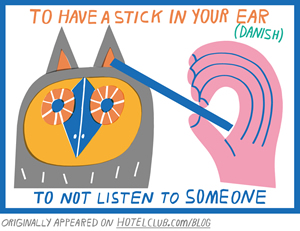
At have en pind i øret (Danish)
To have a stick in our ear (to be drunk)
Avoir un chat dans la gorge (French)
To have a cat in (one's) throat
DON’T COUNT YOUR CHICKENS BEFORE THEY’RE HATCHED
Peshku në det, tigani në zjarr. (Albanian)
Fish in the sea, pan in the stove.
No diguis blat fins que no sigui al sac i ben lligat (Catalan)
Don't say wheat until it's in the sack and it's well tied
Ne spremaj ražanj dok je zec još u šumi (Croatian)
Do not prepare the skewer while the hare is still in the woods
Man skal ikke selge skinnet, før bjørnen er skutt (Danish)
One should not sell the fur before the bear has been shot
Älä nuolaise ennen kuin tipahtaa (Finnish)
Don't start licking it up before it drops on to the table
En nylje karhua, ennen kuin se on kaadettu (Finnish)
I don't skin a bear before it's been felled
Il ne faut jamais vendre la peau de l’ours avant de l’avoir tué (French)
Never sell the fur of the bear before the bear has been killed
Tsitsilebs shemodgomaze itvlian (Georgian)
One should count chickens in autumn
Du sollst den Tag nicht vor dem Abend loben (German)
You shouldn't praise the day before the night.
Mi logariazeis khoris ton xenodokho (Greek)
Don't make counts without the innkeeper
Mithena pro tou telous makarize (Greek)
Don't pronounce yourself blessed before the end
Nyugtával dicsérd a napot (Hungarian)
Praise the day when the sun is set
Ne igyál előre a medve bőrére (Hungarian)
Don't drink to the bear's skin in advance
Non dire gatto se non ce l'hai nel sacco (Italian)
Never say 'cat' if you have not got it in your sack
Nesakyk ,,op'', neperšokęs balos (Lithuanian)
Don't say hop, before jumping over the marsch
Na neroden Petko kapa mu skroile (Macedonian)
They sewed a hat to Peter who is not born yet
Tgħoddx il-flieles qabel ma jfaqqsu (Maltese)
Do not count the chicks before they hatch
Nie dziel skóry na niedźwiedziu (Polish)
Don't share the skin while it's still on the bear
Nu vinde pielea ursului din pădure (Romanian)
Don't sell the skin of the bear that is still in the forest
Tsiplyat po oseni schitayut (Russian)
one should count chicks in autumn
Ne govori gop, poka ne pereskochish (pereprygnesh) (Russian)
Don't say hop until you jumped over
Nu da vrabia din mână pe cioara de pe gard (Romanian)
Do not give away the sparrow in your hand for the crow sitting on the fence
Nechvál deň pred večerom (Slovak)
Don´t praise the day before the evening
Nehovar hop kým nepreskocíš (Slovak)
Don´t say hop until you jump
Ne hvali dneva pred nočjo. (Slovenian)
Do not praise the day before the night.
Dereyi görmeden paçalari sivama (Turkish)
Do not roll up your trouser-legs before you see the stream.
IT’S RAINING CATS AND DOGS
Kiša lije k'o iz kabla. (Bosnian)
The rain is pouring like from cable.
ploure a bots i barrals. (Catalan)
To rain wineskins and pitchers.
Padají trakare. (Czech)
It's raining wheelbarrows.
Det regner skomagerdrenge. (Danish)
It's raining shoemakers' apprentices.
Het regent pijpenstelen. (Dutch)
It’s raining pipestems.
Il pleut comme une vache qui pisse. (French)
It’s raining like a pissing cow.
Il pleut des cordes/des hallebardes. (French)
It is raining ropes/halberds.
Kokispirulad tsvims. (Georgian)
It's raining like from a jug.
Es regnet Bindfäden. (German)
It is raining thread.
Es regnet Schusterbuben. (German)
It is raining young cobblers.
Βρέχει καρεκλοπόδαρα. (Brékhei kareklopódara.) (Greek)
It's raining chair legs.
Esik, mintha dézsából öntötték volna (Hungarian)
It rains as if it had been poured from a basin.
Ag cur sceanaí greasaí. (Irish)
It's raining shoemakers knife.
Līst kā pa Jāņiem. (Latvian)
It is raining like on a Midsummer.
Pila kaip iš kibiro. (Lithuanian)
It is pouring like from a bucket.
Está chovendo canivetes. (Portuguese)
It is raining pocket knives.
Em abril aguas mil. (Portuguese)
In April, million waters.
Plouã cu gãleata. (Romanian)
It’s raining with a bucket.
L'yot kak iz vedra. (Russian)
It is pouring like from a bucket.
Prší ako z krhly. (Slovak)
It´s raining like from a watering-can.
Lije kot iz škafa. (Slovenian)
It´s pouring like from a bucket.
Estan lloviendo hasta maridos. (Spanish)
It's almost raining husbands.
Bardaktan boşanırcasına yağıyor. (Turkish)
It is raining as if it is pouring out of a cup.
Mae hi'n bwrw hen wragedd a ffyn. (Welsh)
It's raining old ladies and walking sticks.
AS EASY AS FALLING OFF A LOG
Mačiji kašalj. (Bosnian)
Cat's cough.
Så let som at klø sig i nakken (Danish)
As easy as scratching the back of your neck
A piece of cake (English)
Simple comme bonjour (French)
As easy as hello
Facile come bere un bicchier d'acqua, facile come andare in bicicletta (Italian)
As easy as drinking a glass of water, as easy as cycling
Lengva, kaip dukart du (Lithuanian)
Easy as two times two
Bułka z masłem (Polish)
Bread roll with butter
Ușor ca bună ziua (Romanian)
As easy as saying hello
Ežu ponjatno (Russian)
Understandable to a hedgehog
Prosto k'o pasulj (Serbian)
As simple as cooking beans
Lahké ako facka (Slovak)
As easy as a slap
Enostavno kot pasulj (Slovenian)
As easy as bean stew
Tereyagindan kil ceker gibi (Turkish)
As if pulling a strand of hair from butter
AS THICK AS THIEVES
Kao prst i nokat (Croatian)
Like finger and nail
Като дупе и гащи (Kato dupe i gashti). (Bulgarian)
Like buttocks and underwear
Kolos kai vraki (Greek)
Like buttocks and underwear
Kuin kaksi marjaa (Finnish)
Like two berries
S‘entendre comme cul et chemise (French)
To get along like one’s buttocks and shirt
Uni comme les doigts de la main (French)
Tied like the fingers of a hand
Come culo e camicia (Italian)
Like butocks and shirt
Ser unha e carne (Portuguese)
To be fingernail and flesh
A fi prieteni la cataramă (Romanian)
To be very good friends
Vodoi ne razol'yosh (Russian)
You can't separate them with water
Hustý ako hmla (Slovak)
As thick as a fog
Ser como uña y carne (Spanish)
To be fingernail and flesh
(De är) som ler och långhalm (Swedish)
(They are) like clay and straw
Aralarindan su sizmaz (Turkish)
Not even water can pass between them
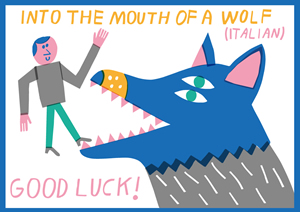
SOMETHING IS ROTTEN IN THE STATE OF DENMARK
Kauppaan on koira haudattuna. (Finnish)
There is a dog buried in the affair.
Les dés sont pipés. (French)
The dice are cheated.
Il y a anguille sous roche. (French)
There is an eel under the rock.
Valami bűzlik Dániában. (Hungarian)
Something stinks in Denmark.
Niečo smrdí v kraji dánskom. (Slovak)
Something is smelly in the state of Denmark.
Hay un gato encerrado. (Spanish)
There’s a cat shut up.
Å ha skjeletter i skapet (Norwegian)
To have skeletons in the cupboard
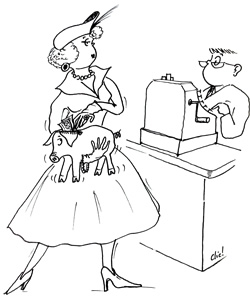
BEGGARS CAN'T BE CHOOSERS
Faute de grives, on mange des merles. (French)
When there's lack of thrushes, one eats blackbirds.
In der Not frisst der Teufel fliegen. (German)
In times of need, the devil eats flies.
Stin anavrochia kalo kai to chalazi. (Greek)
In times of drought, hale is fine.
Szükség törvényt bont. (Hungarian)
Necessity breaks the law.
Calul de dar nu se caută la dinți. (Romanian)
Don't look a gift horse in the mouth.
Potreba železo láme. (Slovak)
Necessity breaks even iron.
Darovanému koňovi na zuby nepozeraj. (Slovak)
Don't look a gifted horse´s teeth.
TO GIVE UP THE GHOST
rhoi'r ffidl yn y to (Welsh)
To put the fiddle in the roof
WHO PAYS THE PIPER CALLS THE TUNE
Qui paga mana (Catalan)
He/she who pays dictates what he/she wants
Cine plăteşte, porunceşte. (Romanian)
He who pays gives the orders.
Кто платит, тот и заказывает музыку. (Russian)
He who pays, orders the tune.
Plati, pa klati. (Serbian)
First pay, then play with it.
A BIRD IN THE HAND IS WORTH TWO IN THE BUSH
Un tiens vaut mieux que deux tu l’auras (French)
I give you one now is better than I will give you two later.
Lieber den Spatz in der Hand als die Taube auf dem Dach. (German)
Better sparrow in the hand than dove on the roof.
Kalio ena kai sto cheri para dyo kai karteri (Greek)
It's better to have one in your hand than wait for two.
Jobb ma egy veréb, mint holnap egy túzok (Hungarian)
It is better a sparrow today, than a bustard tomorrow.
Labāk zīle rokā nekā mednis kokā (Latvian)
It's better to have a tomtit in hand than a wood grouse on a tree.
Подобро врапче во рака отколку гулаб на гранка. (Podobro vrapce vo raka otkolku gulab na granka. (Macedonian)
Better sparrow in hand than dove on the branch.
Aħjar għasfur f'idejk milli mija fl-ajru. (Maltese)
Better a bird in the hand than hundred in the air.
Lepszy wróbel w garści niż gołąb na dachu. (Polish)
Better sparrow in hand than pigeon on the roof.
Лучше синица в руке, чем журавль в небе. (Russian)
Better a tit in the hand than a crane in the sky.
Lepší vrabec v hrsti, ako holub na streche. (Slovak)
Better sparrow in hand than pigeon on the roof.
Más vale pájaro en mano que ciento volando. (Spanish)
A bird in the hand is better than a hundred in the air.